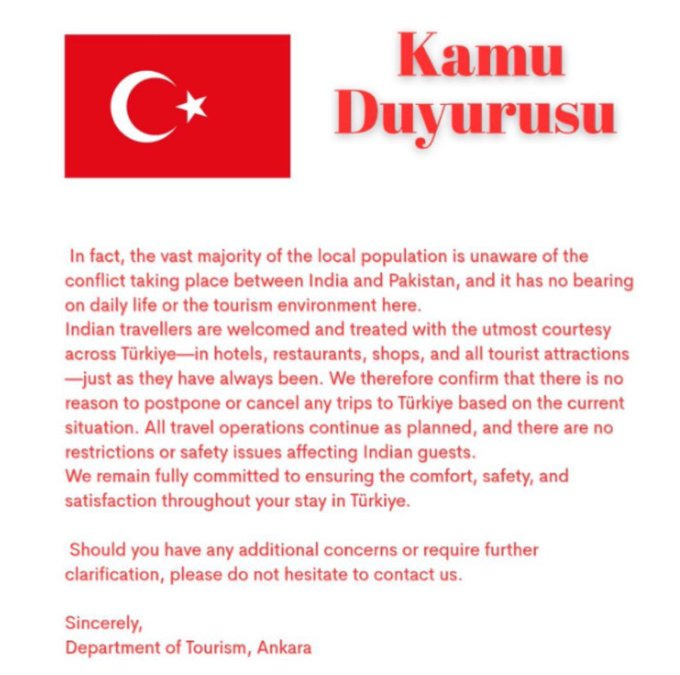India is banning this country
are you?
Hey there,
It’s Wednesday. You’re halfway through the week, still sane, still scrolling, still soaking in international drama.
Let’s catch up on the headline that’s got diplomacy, tourism, and Twitter all tangled up…
📌 Turkey begs Indians to return
A letter, allegedly from the Turkish Department of Tourism, surfaced this week on social media platform X (formerly Twitter), urging Indian tourists not to cancel their trips to Turkey.
The letter, attempting to assure Indian citizens of their safety, came in response to a growing boycott of Turkish tourism.
Indian travelers and companies have been distancing themselves from Turkey due to its perceived alignment with Pakistan during escalating border tensions.
While the authenticity of the letter is still unverified, it struck a nerve.
Social media users quickly labelled it a desperate PR move, interpreting it as Ankara’s attempt to protect its tourism economy while continuing to support India’s adversary in international affairs.
Shiv Sena (UBT) MP Priyanka Chaturvedi responded pointedly:
“No Türkiye, Indians won’t come spending money on tourism in a country that uses the same to arm Pakistan.”
This sentiment is not isolated. Prominent Indian business figures like Harsh Goenka have called for a boycott, and Indian travel firms like EaseMyTrip and Cox & Kings have suspended all packages to both Turkey and Azerbaijan.
One user commented:
“They make it sound as if we are avoiding Turkey out of fear. The truth is, we are rejecting its politics.”
The backlash illustrates a shift: Indian citizens and corporations are increasingly aligning consumer choices with national sentiment, and the implications for Turkey’s tourism economy, where India is a key market, could be substantial.
📌 India also blocked Turkish broadcaster’s X account
In a more formal and concrete step, the Indian government has blocked the X handle of TRT World, Turkey’s state-run international broadcaster, citing the spread of misinformation related to national security.
When Indian users attempted to access the TRT World account, they were met with the notice:
“Account withheld in India in response to a legal demand.”
The block follows Turkey’s public support for Pakistan amid the recent ‘Operation Sindoor,’ India’s retaliatory strike after a deadly terror attack in Pahalgam.
TRT World was accused of spreading biased narratives and unverified claims in the days following the incident.
Adding to the diplomatic escalation, Turkish President Recep Tayyip Erdoğan tweeted:
“Long live Pakistan-Turkey friendship.”
This has fueled further criticism from Indian lawmakers and citizens alike, who argue that Turkey cannot expect tourism revenue from India while simultaneously endorsing Pakistan’s position in regional conflicts.
The action against TRT World also coincided with similar blocks on the X handles of Global Times and Xinhua, both Chinese state-run media outlets.
These accounts published a report (based on Pakistani military sources) falsely claiming that Pakistan had shot down a third Indian fighter jet.
India’s Embassy in Beijing swiftly refuted the report and condemned the dissemination of false information.
“Dear Global Times, we recommend you verify your facts and cross-check sources before pushing out disinformation,” the embassy posted publicly.
📌 For your context
These events are not isolated. They represent an evolving pattern in Indian foreign policy:
By blocking misleading foreign media and countering diplomatic posturing with economic and legal responses, India is asserting control over its narrative in the international space.
Tourism, once seen as an apolitical avenue of exchange, is now under scrutiny. Where India travels, and doesn’t is becoming a barometer of trust and alignment.
The incident reinforces how state-controlled media outlets are being used to shape public perception and foreign policy in real time. India's legal responses show a determination to counter that influence swiftly.
The swift and unified backlash from Indian netizens, influencers, politicians, and companies illustrates how public opinion in India now actively influences international relationships and commercial outcomes.
So, that’s it for today. If you enjoyed this edition, subscribe to hear from us every day!
See ya 👋




